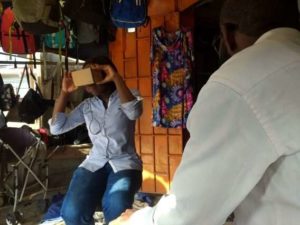Virtual reality project gauges citizens’ faith in law enforcement in the face of gang violence
 While investigating the impact of gang violence on Lagos, Nigeria, the sixth-year political science doctoral candidate came up with an innovative research tool: immersive, virtual reality (VR) videos.
While investigating the impact of gang violence on Lagos, Nigeria, the sixth-year political science doctoral candidate came up with an innovative research tool: immersive, virtual reality (VR) videos.
After spending significant time on the ground in places like Iraq, Afghanistan, Bosnia, and Kosovo, he became keenly aware of "criminal organizations operating in many of these places under the surface," and of frequent collusion between criminal groups and governments.
"You could have a government with all the resources, the trappings of legitimacy and legal frameworks, and still have small, illegal organizations that exercise a surprising degree of control in communities," he says.
He decided to focus specifically on how and why people in communities afflicted by gang violence decide to cooperate with police. "If someone sees a shooting or hears about somebody involved in a shooting, what determines if that person shares information with the police?" Miller wondered.
Trust issues
Hoping to develop a broadly applicable theory, Miller chose two very different locales as research sites: Lagos, Nigeria, and Baltimore, Maryland.
So Miller devised the notion of VR vignettes played on mobile phones to engage subjects and make it a more realistic experience for them.
After 11 months in Nigeria, Miller has begun to glean insights from his fieldwork. Among them: The central constraint to reporting incidents to police is "a deep-seated perceived retaliation risk from gangs, which are regarded with both antipathy and fear," says Miller. (One possible remedy to this hurdle that he identified through his research: expanding access to anonymous police tip lines—not currently available in Lagos.)
"It was surprising to me that, even in cases where police are widely perceived as corrupt, citizens hold an enduring faith in their ability to bring law and order, as long as it doesn't jeopardize personal safety," he says. "People show amazing resilience in the face of their problems."
See the full story here: https://phys.org/news/2019-05-virtual-reality-gauges-citizens-faith.html
Pages
- About Philip Lelyveld
- Mark and Addie Lelyveld Biographies
- Presentations and articles
- Tufts Alumni Bio